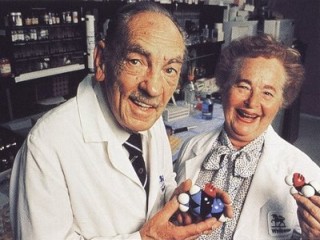
George H. Hitchings biography
Date of birth : 1905-04-18
Date of death : 1998-02-27
Birthplace : Hoquiam, Washington,U.S.
Nationality : American
Category : Science and Technology
Last modified : 2011-12-20
Credited as : scientist, Developed medicines for leukemia, herpes, arthritis, Nobel laureate
0 votes so far
American pharmacologist George H. Hitchings was a long-time lab director and later Vice President of Burroughs-Wellcome, a pharmaceutical company which has since been absorbed into GlaxoSmithKline.
Hitchings and his colleagues developed new methods for pharmaceutical research, analyzing the deoxyribonucleic acid (DNA) in normal human cells and comparing it with the DNA in diseased cells, bacteria, protozoa and viruses, to determine how cells assemble the genetic building blocks of DNA, and designing drugs that interrupt that process. Hitchings' lab introduced several new drugs, including acyclovir (for herpes), allopurinol (for gout), azathioprine (which suppresses the body's rejection of transplanted organs, and is also useful for arthritis and other immune disorders), thioguanine and 6-mercaptopurine (for leukemia), and trimethoprim (for bacterial infections).
He was awarded the Nobel Prize for Medicine in 1988, sharing the honor with Gertrude B. Elion, who had been the second employee hired in his lab at Burroughs-Wellcome, and with Sir James W. Black. Hitchings donated his Nobel funds to a charity he had established, which provides health care for the poor and protects battered women.
















